Aussie shares sink to lowest since 2016 despite Wall Street surge
A broad market drop has sent the ASX to its lowest closing levels since 2016 after heavy swings in the final hour of trade.
Markets
Don't miss out on the headlines from Markets. Followed categories will be added to My News.
A broad market drop has sent the ASX to its lowest closing levels since 2016.
By the close on Wednesday, shares were down 340.2 points or 6.43 per cent to 4953.2.
That’s despite a rally on Wall Street, as fears of a local recession were stoked by further restrictions on travel, The Australian reports.
Local investors have been waiting to hear about Australian measures to ease economic pain from the coronavirus.
Prime Minister Scott Morrison has flagged further measures to stimulate the economy, without detailing them.
He also told Australians not to hoard and not to travel abroad.
Australia’s ailing airlines will be handed a $715 million federal government lifeline to help the sector through the coronavirus pandemic.
Regional carrier Rex has been urging government action, warning it could go under unless given help during the tumultuous period.
Its shares nosedived 24 per cent to 63 cents at noon.
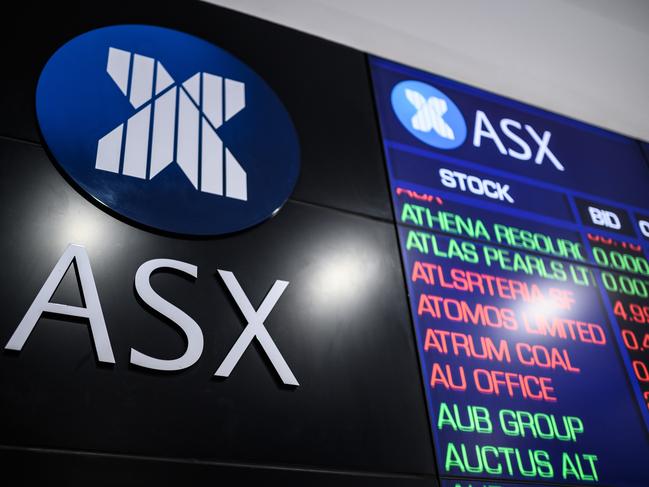
Virgin shares rose 11 per cent to seven cents after it cancelled all international flights and slashed domestic capacity.
Qantas shares fell 10.84 per cent to $2.55.
The “big four” banks dived between five per cent and 6.9 per cent but Macquarie Group fell harder. It dropped $13,07, or 12.51 per cent, to $91.42.
Australian retail turnover for February turned out to be higher than expected on panic buying.
Supermarkets gained as Woolworths added 37 cents, or 0.93 per cent, to $40.22 and Coles registered a six-cent, or 0.35 per cent, gain to $17.28.
The tech stock index tanked almost seven per cent as Afterpay nose dived 18.84 per cent to $15.47.
Property developer Mirvac was among a string of listed companies scrapping earnings guidance due to the Covid-19 pandemic on Wednesday. Mirvac shares fell 6.5 per cent to $2.29.
Ardent Leisure was down 4.44 per cent at 21.5 cents as it shuts down event centres while the tourism industry is being hammered by the pandemic. Oil prices sank lower overnight amid recession fears. Woodside fell 3.12 per cent to $18.31 as Santos dipped 8.68 per cent to $3.26 and the wider energy index fell 6.32 per cent.
Gold prices rose overnight as bargain hunters bought up safe haven assets. Newcrest was up $1.25, or 5.21 per cent, at $25.25 and Evolution Mining was up 37 cents, or 10.19 per cent, at $4.00.
The Reserve Bank of Australia is expected to announce further measures to protect the economy on Thursday.
The highly volatile local market had its best day ever on Tuesday, gaining 5.8 per cent, after its worst day ever on Monday, falling 9.7 per cent.
Meanwhile, the Aussie dollar has dropped below 60 US cents for the first time since April 2003.
It was buying 59.95 US cents at midday AEDT on Wednesday from 60.86 US cents as the market closed on Tuesday.
MARKET CLIMBS ON TRUMP’S STIMULUS NEWS
Stocks have rebounded following Wall Street’s sharpest daily drop in more than three decades as the United States took steps to try to deal with the economic fallout from the coronavirus.
The dollar bounced back from heavy losses against the euro on Monday, and oil prices, which had drifted below $US30 per barrel, pushed higher.
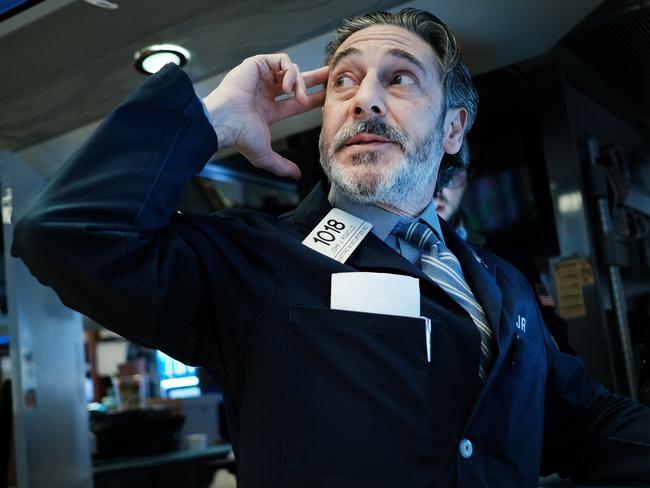
MORE NEWS:
Anzac Day services axed as travellers told come home
GoT actor has Covid-19 as Pink reveals stay at home plans
What frontline workers need to know about virus
How to self-isolate the right way
Wall Street stock indices rebounded from the opening bell after having collapsed on Monday in their worst day since 1987.
The Dow Jones Industrial Average finished up 5.2 per cent or around 1050 points at 21,237.31, a day after shedding almost 3000 points.
The broad-based S&P 500 gained 6.0 per cent to 21,237.31 while the tech-rich Nasdaq Composite Index jumped 6.2 per cent to 7,334.78.
Australian investors could see the local market open flat for a change despite a huge surge on Wall Street.
The SPI200 futures contract was down just seven points, or 0.13 per cent, at 5275 points at 7am AEDT, suggesting Australia’s volatile market might open flat.
The gains on Wall Street accelerated when Treasury Secretary Steven Mnuchin said that the White House will present its massive stimulus plan to Congress for rapid approval, and favours sending direct payments to all Americans right away.
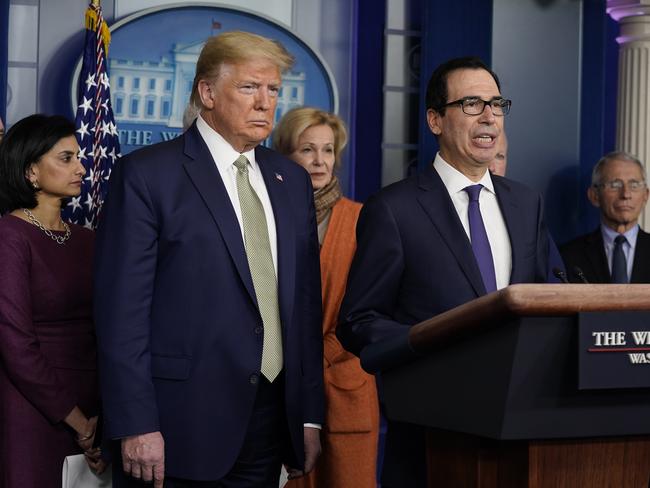
“The payroll tax holiday would get money to people over the next six to eight months. We’re looking to send checks to Americans immediately,’ Mr Mnuchin said. “Americans needs cash now and the president wants to give cash now.”
“And I mean now – in the next two weeks,” Mr Mnuchin added.
He said the amount could be more than $US1000. There would also be some income cut-offs.
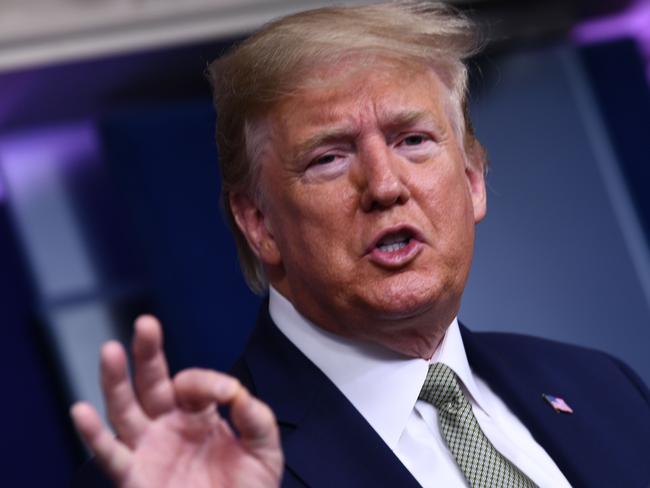
Reports had already circulated that US President Donald Trump will ask Congress to approve a massive $US850 billion emergency spending package to contain the growing economic damage from the coronavirus pandemic that will include a payroll tax cut and a bailout for airlines.
“Just as investors were starting to seriously flag once again, the Fed actually managed to pull off a market-boosting intervention after a string of false dawns,” said market analyst Connor Campbell at Spreadex.
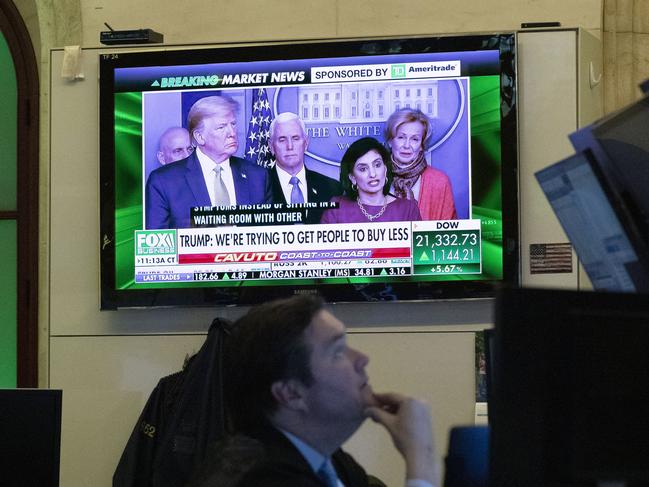
On Tuesday, the NY branch of the US Federal Reserve also unveiled a new credit facility to help households and business stay afloat.
Mr Campbell pointed in particular to the Fed’s Commercial Paper Funding Facility which will buy up short-term debt issued by struggling companies seeking to raise cash and which had been under intense stress in recent days.
“It seems that, after being sceptical of the Fed’s rate cuts and trillion dollar stimulus injections, the creation of this new special credit facility was the kind of thing investors were hoping for,” he said.
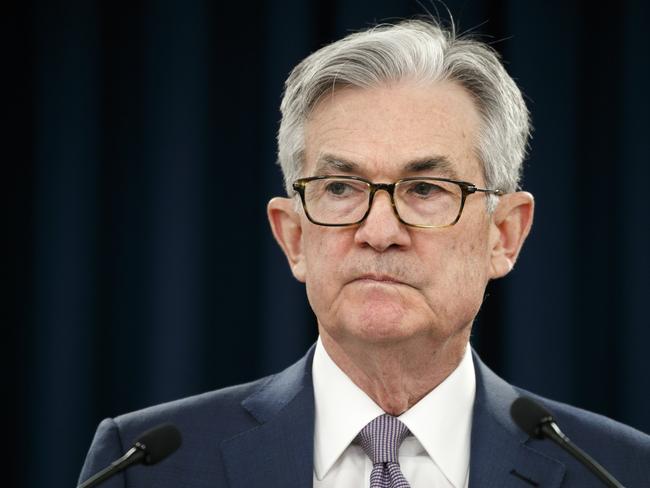
The Fed has taken interest rates down to virtually zero and this week has injected $US1 billion into financial markets on top of $US1.5 trillion last week.
European stock markets, which had surged around five per cent in early deals on Tuesday before erasing their gains, bounced back into positive territory.
Both London and Paris closed 2.8 per cent higher. Frankfurt rose 2.3 per cent and Milan 2.2 per cent.
European governments have also been unveiling new measures to support their economies, with both France and Spain announcing tens of billions of euros in aid.
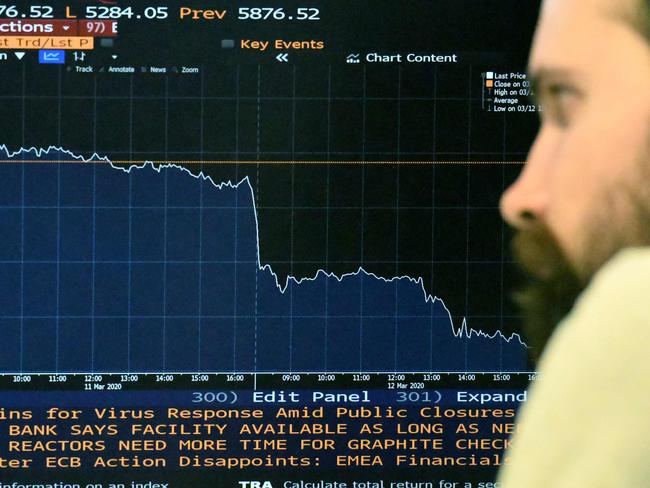
The Italian government moved to renationalise the bankrupt former national carrier Alitalia under an emergency economic rescue package, and France signalled it would not hesitate to nationalise firms to protect them from collapsing.
In a move meant to help tame the massive volatility in the markets caused by the coronavirus outbreak, the French bourse regulator on Tuesday banned short-selling in 92 top stocks for the day.
While governments and central banks attempt to soothe markets with massive stimulus pledges and interest rate cuts, more countries are going into lockdown to prevent the outbreak’s spread — bringing the world economy juddering to a halt.
There is a broad consensus that the disease, which has wiped trillions off market valuations, will cause a global recession, with the airline industry among the first in the firing line, leading company heads to plead for billions in state help to prevent them going under.
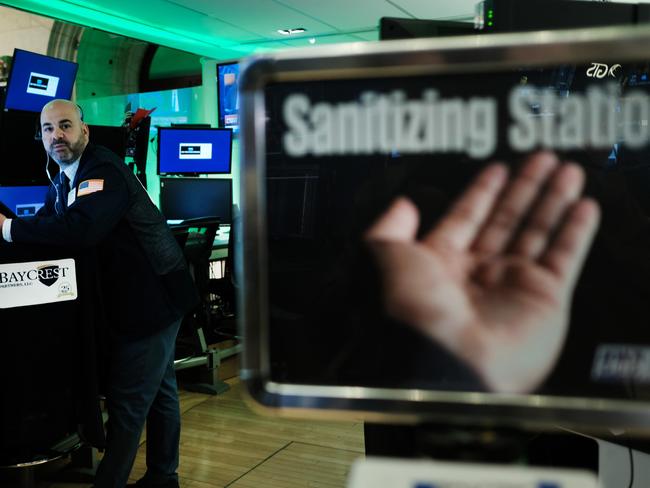
The Philippines became the first country to shut down its stock market as the country goes into lockdown, and the bourse will be closed until further notice.
The White House said it wants to keep markets open, but said it may shorten trading hours.
France moved to ban short selling on a number of stocks which had been hit particularly hard in the panic selling which has gripped markets in recent days.
Investors use short-selling to bet the market will fall, putting tremendous downward pressure on prices at a time when buying interest is virtually non-existent.
Oil prices climbed higher following the US announcements. Earlier Brent slid below $US30 per barrel after have plunged more than 12 per cent on Monday.
Adding to the weakness in crude markets is the price war between major producers Saudi Arabia and Russia.
Originally published as Aussie shares sink to lowest since 2016 despite Wall Street surge
